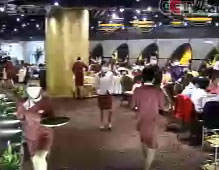 More Chinese people are getting used to separate dining habits with a sharpened awareness of the importance of hygiene and health in such practice. More Chinese people are getting used to separate dining habits with a sharpened awareness of the importance of hygiene and health in such practice.
I was expectant but at the same time a bit uneasy about visiting my relatives during the holidays. Expectant, because I would have a lot of fun with my friends; uneasy because some of the older relatives would likely be ever more hospitable at the dinner table and offer to serve me with their own chopsticks. They'd no doubt also insist that I have more-dishes...probably not to my liking. Traditionally people believe that this is a way to show their hospitality to their guests or friends. Today people seldom fetch food for others, but still we share food in the same dishes most of the time. This habit is changing though, especially since the outbreak of SARS.
Habits die hard, either good or bad ones. But as long as it is changing for the better, people will soon get used to it and form new habits again. It might be hard for some people to practice separate dining after the SARS epidemic because they'll sense a lack of spirit at the dinner table. Like people’s early resentment of the ban on fireworks during Spring Festival and their later calm and willing acceptance of it, people will probably soon find new ways to enjoy goodwill and friendship while dining separately.
The western style of food began to find its way onto the dining table of Chinese people 20 years ago when China opened its door to the outside world. Its increasing popularity doesn’t come for no reason: quiet and refined eating surroundings, high standards of food processing, and the separate dining method, which is totally different from China’s traditional dish sharing. These become popular, especially with younger people.
The surroundings in western style restaurants are very good. Separate dining is unlike the Chinese way of sharing food from the same dishes. And it is now a time to guard against SARS, and using a western style of eating is more hygienic and is useful in preventing the disease.
People choose western food, however, not just because of the threat of SARS. Unlike often busy and noisy Chinese restaurants, in a western style restaurant, you can enjoy melodic music, which is favorable to both the ears and the stomach. Chinese restaurants rarely offer the tranquility and romance of sharing a quiet moment of eating with family or a loving couple. Using knives and forks and separate dishes is quite a break with tradition because the Chinese people have long been using chopsticks and sharing food from the same utensils. Food is culture; and the Chinese people have in fact tasted Western culture from their food. It is a new and refreshing experience. But then, the western restaurants didn’t escape the impact the SARS has dealt on China’s catering business.
“SARS has indeed imposed a very serious effect on China’s catering industry. The key epidemic areas such as Beijing, Shanxi, Hebei and Guangdong Province suffered most greatly from late April to the May Day holiday period. About 70 percent of restaurants were shut down and their turnover dropped about 90 percent. Some only got a small percent of their annual revenue. The sales volume of Quanjude Roast Duck Restaurant in Qianmen for instance first exceeded 100 million yuan last year, but during the May Day holiday period this year, the restaurant gained only a 3 percent of what was gained the same period last year,” said Wang Jiagen, secretary general of World Association of Chinese Cuisine.
In order to revert the negative SARS impact and win back customers, restaurants in Beijing took all measures possible to promote a hygienic and safe place for customers. But still business was less than slack. The average restaurants suffered a 70-80 percent loss of revenue. Towards the end of May when the SARS epidemic was effectively controlled, some restaurants began to reopen for business and people began to eat out after a month of self isolation. But they set different requirements on the service. All restaurant attendants wear face masks and separate food into individual dishes for their customers--a habit quite different from the past. Eating separately, but people enjoy their food no less than before.
Separate dining in China didn’t originate because of SARS. “We’ve long been practicing (separate dining). Sharing food in the same dish may cause SARS to spread through water droplets. If you share food from the same dish with one person with SARS, you may get infected by the virus. To effectively prevent SARS from spreading, we require that all restaurants adopt separate dining system,” said Wang Jiagen.
 Traditionally, Chinese hold that dining, especially dining with family members or friends is a time for happiness and excitement. It is not an occasion for food only, but a way to express their inner feelings.
Traditionally, Chinese hold that dining, especially dining with family members or friends is a time for happiness and excitement. It is not an occasion for food only, but a way to express their inner feelings.
“We insist on separate dining in good-sized banquets. For a very long period of time, we have conformed to separate dining habit while entertaining foreign guests or friends. If there is no SARS and there is nobody setting such demands in the future, personally, I think only a small proportion of people would like separate dining during gatherings with family or friends. But now before SARS completely dies out, it is mandatory that restaurants serving their food separately. It is compellent,” Wang Jiagen also said.
Chinese people often boast of their capability of learning from different cultures and their capacity of integrating diversity into their own culture. The adoption of separate dining didn’t begin with the outbreak of SARS. The SARS epidemic only spurs people to get rid some of their bad habits and to adopt new ones and helps sharpen their awareness of hygiene and health.
|